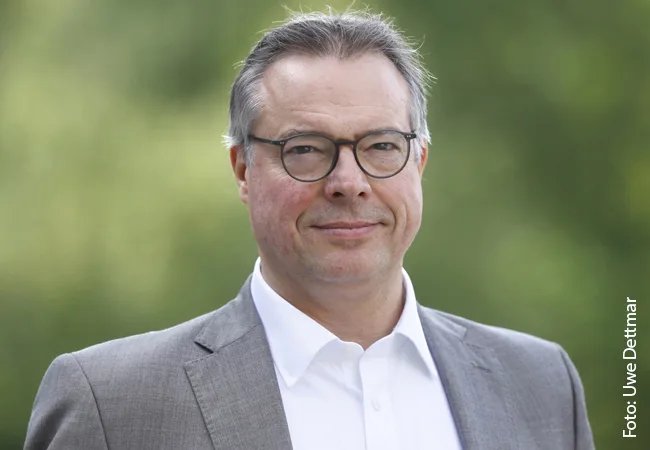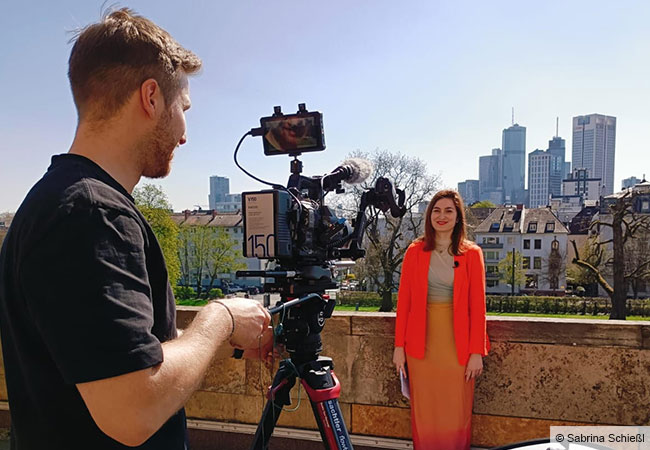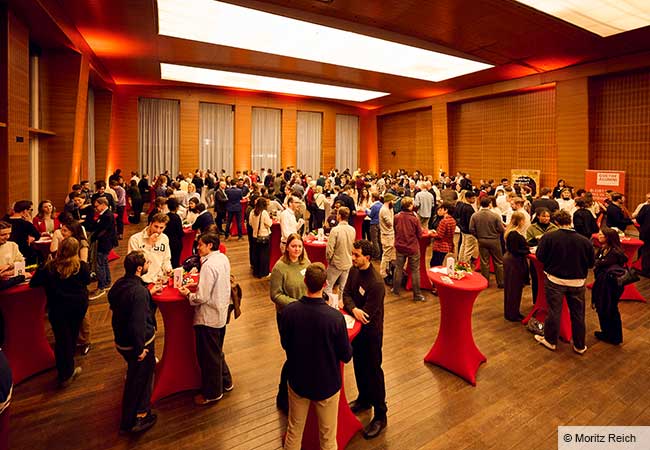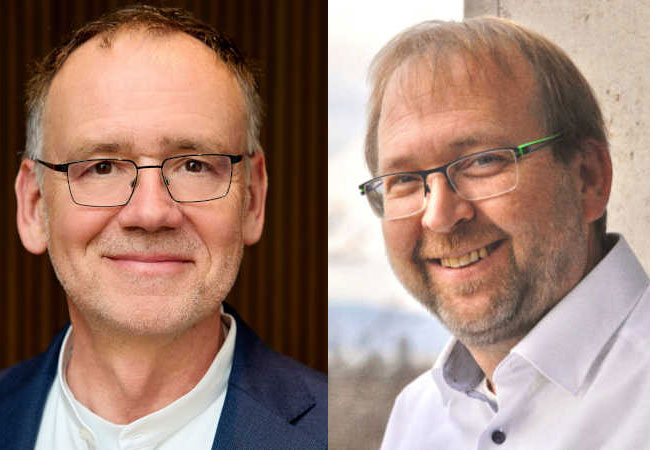Internationalization requires allies, says Dr. Johannes Müller, who took over as head of Goethe University Frankfurt’s Global Office, part of the Global Affairs Study and Teaching division, on July 15, 2023. In this interview, he talks about his job and his plans, and how the framework conditions for international mobility have changed.

Dr. Johannes Müller, Head of Goethe University’s Global Office
UniReport: Dr. Müller, you recently took over as head of the Global Office, following several years at Cologne University. What do we need to know about you?
Johannes Müller: I was born in Hanau and went to school in Offenbach. I studied in Cologne and Florence/Italy, where I lived for five years and completed my doctorate at the European University Institute. Afterwards, I returned to Cologne University, where I spent the next 15 years working at the International Office. I’m a historian, so I always start by asking about the origins of things: I want to understand why a condition developed before I ask myself what aspects I can improve how. That’s what I want to do here in Frankfurt, and that’s why I’m taking time to really get to know Goethe University.
Goethe University President Enrico Schleiff’s vision is that of an excellent, international university in the digital age. Which aspects of internationalization fall under the responsibility of the Executive Board, and which under those of the Global Office?
The president has the authority to issue guidelines and set the course. By contrast, the Global Office is the “foreign ministry”, if you will, tasked with implementing the Executive Board’s goals within the framework offered by these guidelines. Like any good ministry, it is of course also our duty to advise the president and make suggestions. That’s what we in the Global Office try to do.
What priorities would you like to set as Head of the Global Office?
In addition to international mainstreaming, which we will talk about in a moment, I have three things in mind. Firstly, I believe that, as an international university, Goethe University should expand its transnational network. That means entering into closer cooperation agreements with European and global networks. Secondly, I think it’s important to diversify international study programs and at the same time also make them more flexible – both for Frankfurt students as well as for international exchange students. Thirdly, I would like to take a closer look at promoting mobility among researchers: there is still room for improvement when it comes to exploiting third-party funding opportunities. As the Global Office, in future we would also like to offer the faculties more support and advice on improving the mobility of scientists.
Goethe University has a broad network of partnerships, some of them at the central university level, others decentrally-situated in the faculties. What role does the Global Office play in these? What support does it offer? Do you ever advise against new partnerships?
At the formal level, the Global Office is responsible for monitoring the conclusion of international partnership agreements, both centrally as well as in the faculties – which, to some extent, has to do with quality control. But we also advise the faculties with regard to their wishes and expectations, and respond to international cooperation inquiries from abroad, in both a demand-oriented and quality-conscious manner. Put differently, the questions we ask include: Do we need a partnership? Is this the right partner for us? There are definitely instances in which we reject partnership offers or give faculties a critical evaluation – although the faculties usually know best who is a right partner for them. In an effort to align our partnership portfolio more strategically, we have also become increasingly proactive. Sometimes this means cutting off old ties. In many cases, we do not need to do this actively: Connections tend to wither away if there is no longer any exchange. At the same time, we want to expand our transatlantic network and are constantly on the lookout for partners, especially with a view towards Africa and Asia, particularly Japan, for example. These are some of the topics we want to work on together with the faculties.
Our „Basic Law“, so to speak, is our mission statement, in which Goethe University commits itself to certain values. Does this have an impact on cooperation agreements with countries that do not respect human rights, for instance? Put differently: Are there political-ethical limits to cooperation? Or is it in fact all the more important in such instances to maintain the cross-border exchange in the spirit of science?
Personally speaking, I think it is very important to set a good example. That being said, expressing political protest by boycotting scientific cooperation is usually counterproductive. There are exceptions – as in the case of Russia, which has placed itself outside the world community as a peace-breaker. But they only serve to confirm the rule that scientific relations constitute the last remaining bridge to experts in countries with which we would otherwise not engage with. Among scientists, you often find people who are still willing to talk – possibly as a result of their own inner immigration. This used to be called science diplomacy, when diplomacy still served as the art of remaining in conversation even in the face of speechlessness. Needless to say, it is always true that academic freedom is also a sign of freedom of opinion – something on which we do not compromise in our scientific partnerships. But we should use scientific relations to strengthen those who think differently, and broaden horizons.
Student mobility – in the form of a semester or an internship spent abroad – has always stood at the heart of the international university. How actively do Goethe University students take advantage of such opportunities? How do our figures compare to those at other German universities?
Our figures in Frankfurt are no better or worse than those of other universities: We find ourselves in the middle of the pack. Unfortunately, the numbers are stagnating across the board because long-term exchange no longer fits today’s study reality with its short-termed Bachelor- and Master-Programs as compared to the more prolonged/expansive diploma degrees of the past, for instance. Back then, it didn’t matter whether a course lasted 12, 14 or even 20 semesters, and a semester or a year spent abroad constituted an opportunity to find oneself anew. Today, with both bachelor and master’s degrees, every semester counts. Add to that the financial difficulties experienced by students, and you get a decline in the willingness to spend time abroad – even though the opportunity continues to generate great interest. That’s why we need to rethink our offerings and do more to ensure students can gain international experience at Goethe University. We need more short-term opportunities that can be taken during semester breaks, for example. We also need offers that exploit the digital possibilities; after all, we want to be an international digital university. It might, for example, be possible to combine a local event with a workshop abroad prepared by virtual meetings. There are even different financing models available. We would like to do more to encourage the faculties to make use of such programs and to integrate them into their courses of study – something on which we are also trying to provide more advice.
Looking at it from the other side: Who comes from abroad to study in Frankfurt? What is the ratio between those who are permanently enrolled here and those who transfer from their home university to their partner Goethe University for just one or two semesters?
In terms of numbers, there are more foreign degree-seeking students here than those participating in a study exchange. For similar reasons as those elaborated above, which make our students hesitant to spend a whole term abroad. Students from North America especially, who have to pay the equivalent of upwards of €20,000 per year or per semester, think twice about coming to Goethe University, where there may be fewer English-language offerings, no courses exactly suited to their study program, or perhaps no information and welcome package that is specifically tailored to their needs as foreign students and offers them added value. My plea is for us to strengthen the attractiveness of our offerings so that, all these things considered, we can still attract interesting partners. Incidentally, one thing we should not forget in all of this is that we only have the opportunity to send someone if someone comes to us in turn.
To my knowledge, only a few Goethe University faculties have their own internationalization experts. How can such a decentralized point of contact boost a faculty’s internationalization?
Internationalization needs as many allies in as many places as possible, including in administration. In our mind, it would be ideal to establish small “international hubs” in the faculties, consisting of an internationalization officer and a small supporting administrative team, which could also be staffed by students. Anything less would make it difficult to truly develop something together. Fortunately, contact persons already exist at most deans’ offices. However, the levels of institutionalization vary, and sometimes it would be nice to see internationalization understood as a joint strategic concern that requires a bit of coordination beyond the day-to-day business.
With iMainstreaming, Goethe University is not only pursuing the goal of making service functions multilingual, but – if possible – also comprehensively analyzing all processes from both a German and an international perspective. To what extent does the Global Office already live by this idea?
Let me start by saying that the idea is great: All departments that handle international aspects take joint responsibility for their international affairs, developing processes and structures that promote the international aspect in and of itself. That being said, however, any time you distribute responsibility for something among many, the subject of responsibility diffuses. Suddenly, no one bears any responsibility anymore. Without coordination, iMainstreaming will fail in the long run. That’s why we would like to get involved in the coordination process and make sure that all those who want and have to bear this responsibility can coordinate and implement their ideas together. One idea we are already pursuing is a working group on international affairs, to be set up initially within the Global Affairs Study and Teaching division, which will serve as a network linking all departments dealing with internationalization. The aim here is to create a framework in which we can jointly discuss ideas on how we can tangibly promote international topics. Speaking from experience I have to say, by the way, that this kind of interdepartmental cooperation works much better here in Frankfurt than at other universities – including Cologne.
According to recent reports in the national media, Germany is not that interesting a location for many international specialists, among others because their reception in the country is not a particularly warm one. How do we at Goethe University welcome our international academics?
Your question refers to the longstanding debate on the right “welcoming culture”, which I find a bit misleading. What we actually need is a welcoming structure rather than a welcoming culture. Anyone can immediately transmit a welcoming culture – all it takes is being open and friendly. What we need are structural anchors that ensure that everyone who comes from abroad and needs and deserves support, also gets it. At the academic level, Frankfurt is very far along in this respect. Our Goethe Welcome Center (GWC) systematically tries to offer support to every international scientist – whether they come here as scholarship holders, doctoral or post-doctoral students, or research assistants. This also applies to employees in the technical-administrative field. Prior to arrival, the GWC not only helps with finding housing and completing paperwork, but also with finding your way around campus and networking. All these services make it a little easier to get started here, and are frequently made use of.
If right now you were offered a scientific position abroad, or would want to study abroad: Where would you go to?
I’m hopelessly and wholeheartedly European, which is also reflected in my own life and studies, which have revolved almost exclusively on and been spent in Europe. As I see things today, if it wants to continue to play a creative role in solving global problems, Europe needs to open up more to Africa and Asia, in particular. Perhaps it even has to reinvent itself. That’s why today I would probably look for ways to connect with these regions at eye level and enter into a university exchange.
Questions: Imke Folkerts













